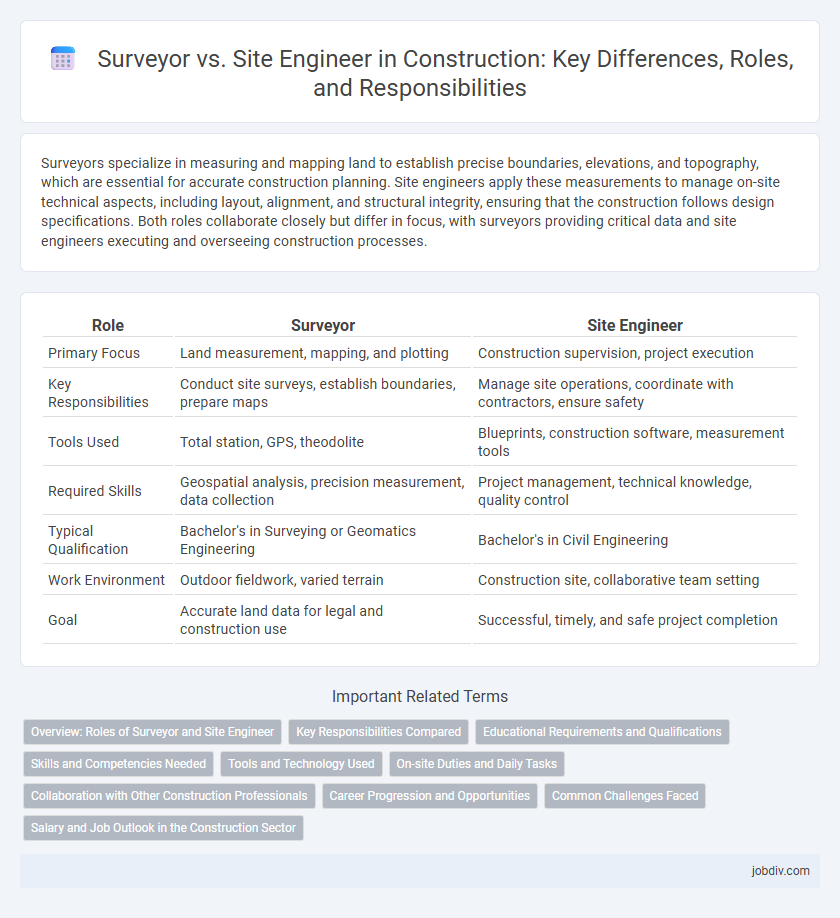Surveyors specialize in measuring and mapping land to establish precise boundaries, elevations, and topography, which are essential for accurate construction planning. Site engineers apply these measurements to manage on-site technical aspects, including layout, alignment, and structural integrity, ensuring that the construction follows design specifications. Both roles collaborate closely but differ in focus, with surveyors providing critical data and site engineers executing and overseeing construction processes.
Table of Comparison
| Role | Surveyor | Site Engineer |
|---|---|---|
| Primary Focus | Land measurement, mapping, and plotting | Construction supervision, project execution |
| Key Responsibilities | Conduct site surveys, establish boundaries, prepare maps | Manage site operations, coordinate with contractors, ensure safety |
| Tools Used | Total station, GPS, theodolite | Blueprints, construction software, measurement tools |
| Required Skills | Geospatial analysis, precision measurement, data collection | Project management, technical knowledge, quality control |
| Typical Qualification | Bachelor's in Surveying or Geomatics Engineering | Bachelor's in Civil Engineering |
| Work Environment | Outdoor fieldwork, varied terrain | Construction site, collaborative team setting |
| Goal | Accurate land data for legal and construction use | Successful, timely, and safe project completion |
Overview: Roles of Surveyor and Site Engineer
A surveyor specializes in measuring land, mapping site layouts, and ensuring precise boundary definitions using advanced instruments like total stations and GPS technology. A site engineer manages on-site construction activities, coordinates with contractors, oversees project execution, and ensures compliance with engineering designs and safety standards. Both professionals collaborate closely to guarantee accurate site positioning and efficient project progress in construction projects.
Key Responsibilities Compared
Surveyors specialize in measuring land boundaries, preparing site plans, and ensuring accurate mapping using GPS and total stations, which is crucial for legal documentation and project initiation. Site Engineers oversee on-site construction activities, coordinate with contractors, interpret technical drawings, and ensure compliance with design specifications and safety standards. Both roles collaborate closely to ensure the project's structural integrity and alignment with regulatory requirements.
Educational Requirements and Qualifications
Surveyors typically require a bachelor's degree in geomatics, surveying, or civil engineering, often complemented by professional certification such as the Licensed Surveyor credential. Site Engineers usually hold a degree in civil engineering or construction management and must have practical experience in project planning and site supervision. Both roles benefit from knowledge of CAD software, with Site Engineers also needing strong skills in project management and construction technology.
Skills and Competencies Needed
Surveyors require expertise in land measurement, boundary identification, and proficient use of GPS and Total Station equipment to ensure accurate site mapping. Site Engineers must possess strong project management skills, technical knowledge of construction methods, and the ability to interpret engineering drawings for effective on-site coordination. Both roles demand problem-solving abilities, attention to detail, and familiarity with safety regulations to maintain efficient and compliant construction processes.
Tools and Technology Used
Surveyors utilize advanced GPS technology, total stations, and laser scanners to accurately measure land boundaries and topography, ensuring precise data collection for construction projects. Site Engineers rely on CAD software, building information modeling (BIM), and field management apps to oversee project execution, coordinate workflows, and ensure alignment with design specifications. Both professionals integrate drone technology and real-time data analytics to enhance accuracy, efficiency, and project monitoring on construction sites.
On-site Duties and Daily Tasks
Surveyors primarily focus on measuring land, setting out construction sites, and ensuring precise site layouts according to project plans and legal boundaries. Site engineers oversee construction activities, coordinate with contractors, and solve on-site technical issues to ensure structural integrity and compliance with design specifications. Both roles require regular site inspections, but surveyors emphasize spatial accuracy while site engineers manage daily operational execution.
Collaboration with Other Construction Professionals
Surveyors and site engineers collaborate closely to ensure precise measurements and accurate implementation of construction plans. Surveyors provide critical data on land boundaries and topography, enabling site engineers to design infrastructure layouts that comply with regulations and project specifications. Effective communication between these professionals enhances project efficiency, minimizes errors, and ensures structural integrity throughout construction phases.
Career Progression and Opportunities
Surveyors often begin their careers with roles in land measurement and mapping, progressing to senior surveyor or project management positions, leveraging expertise in geospatial data and regulatory compliance. Site Engineers typically advance from entry-level technical roles to site management, becoming project engineers or construction managers through gaining experience in site coordination, health and safety, and resource management. Both careers offer opportunities for specialization and leadership in large-scale construction projects, with site engineers focusing more on on-site operational control and surveyors emphasizing data accuracy and legal boundaries.
Common Challenges Faced
Surveyors and site engineers frequently encounter communication gaps that lead to project delays and inaccuracies in measurements. Misalignment in interpreting design plans often causes rework and cost overruns on construction sites. Both roles must navigate challenges related to environmental conditions and evolving regulatory standards that impact project timelines and compliance.
Salary and Job Outlook in the Construction Sector
Surveyors in the construction sector typically earn a median salary ranging from $50,000 to $80,000 annually, with job growth projected at 8% over the next decade due to increased infrastructure developments. Site engineers command a higher median salary, often between $65,000 and $95,000, reflecting their critical role in project management and technical oversight, with job opportunities expected to grow around 10% as construction projects expand. Both professions benefit from steady demand, but site engineers often experience faster career advancement influenced by evolving construction technologies and regulatory standards.
Surveyor vs Site Engineer Infographic

 jobdiv.com
jobdiv.com